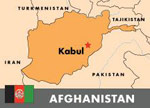 Bloomberg: A U.S. plan to upgrade its airbase in southwestern Afghanistan just 20 miles from Iran’s border will likely rile the Islamic regime, bolstering suspicions the West is trying to pressure it with military might, analysts say.
Bloomberg: A U.S. plan to upgrade its airbase in southwestern Afghanistan just 20 miles from Iran’s border will likely rile the Islamic regime, bolstering suspicions the West is trying to pressure it with military might, analysts say.
By Tony Capaccio
 May 21 (Bloomberg) — A U.S. plan to upgrade its airbase in southwestern Afghanistan just 20 miles from Iran’s border will likely rile the Islamic regime, bolstering suspicions the West is trying to pressure it with military might, analysts say.
May 21 (Bloomberg) — A U.S. plan to upgrade its airbase in southwestern Afghanistan just 20 miles from Iran’s border will likely rile the Islamic regime, bolstering suspicions the West is trying to pressure it with military might, analysts say.
The Defense Department is requesting $131 million in its fiscal year 2011 budget to upgrade Shindand Air Base so it can accommodate more commando helicopters, drone surveillance aircraft, fuel and munitions.
Plans to expand the base come as the U.S. works to strengthen the militaries and missile defenses of allies in the region and presses at the United Nations for a new round of sanctions aimed at forcing Iran to curb its nuclear program.
U.S. military officials say the base is only to support U.S. and Afghan military operations in Afghanistan. Iran will likely view the Shindand buildup as another step to squeeze it, said Kenneth Pollack, director of the Saban Center for Middle East Policy at the Brookings Institution in Washington.
“Whatever U.S. intentions, the Iranian regime will see it as a threat — as another American effort to surround Iran with U.S. military forces,” Pollack said in an interview.
“The Iranians are almost certainly going to assume that a beefed-up intelligence, surveillance and reconnaissance presence is really about spying on them,” he said.
Andrew Krepinevich, president of the Center for Strategic and Budgetary Assessments in Washington, shares that view.
“The positioning of the base gives us the opportunity to monitor any efforts by Iran to serve as a sanctuary for anti- government Taliban and allied forces, and to support operations in Iran itself if that were to become necessary,” he said.
Sanctions
The Pentagon planning for Shindand comes as the U.S. is helping to strengthen missile defense systems in Israel and allied nations in the Persian Gulf.
The U.S. Navy is coordinating its ship-borne Aegis missile defense with Israel’s land-based systems, and Defense Secretary Robert Gates and other top U.S. military officials have encouraged Persian Gulf nations to strengthen and coordinate their individual defenses.
Saudi Arabia and the United Arab Emirates also are upgrading their air, ground and naval forces, spurred by Iran’s military buildup.
The United Arab Emirates has spent $18 billion since 2008 on U.S.-supplied training, munitions and equipment such as the Patriot missile defense built by Lockheed Martin Corp.
Fighter Jets, Missiles
Saudi Arabia has bought 72 Eurofighter Typhoon jets and is in negotiations to buy 24 more. The nation also has bought Sidewinder air-to-air missiles, laser-guided equipment to enhance the accuracy of its air-to-ground missiles, Black Hawk helicopters and U.S. kits to upgrade Apache helicopters and armored personnel carriers.
“We have worked hard in the region to build a network of shared early warning, of ballistic missile defense and of other security relationships,” General David Petraeus, the U.S. military commander in the Middle East and Central Asia, told the Senate Armed Services Committee on March 16.
Strengthening Gulf partners is important because containing Iran “will be a challenge as long as Iran’s theocracy keeps building asymmetric forces, moving towards nuclear capability and using proxies and non-state actors in neighboring states,” Anthony Cordesman, a military analyst at the Center for Strategic and International Studies in Washington, said.
Asymmetric forces are used in an attempt to offset the capabilities of a more advanced military foe. Iran might deploy speedboats in a swarm to attack U.S. warships, military officials have said.
Containment Strategy
Iran will view the U.S. base expansion and acceleration of “missile defense and other systems in the Gulf states” as part of a containment strategy, said Kenneth Katzman, a Middle East analyst with the non-partisan Congressional Research Service.
The U.S. should be prepared for what could be a vigorous reaction, he said. “‘Iran will almost certainly respond by stepping up weapons shipments to Taliban militants in Herat and Farah provinces, and Tehran might direct these militants to use the assistance to attempt attacks on the airfield,” he said.
Pollack gave a similar warning. “We need to go in with eyes wide open that we could be provoking them,” he said. “We should not be expanding our operations in this area unless we are ready to deal with the potential.”
Michael O’Hanlon, a military analyst for the Brookings Institution who is in Afghanistan, said he heard from U.S. military officials that Shindand is in line for “a limited tactical expansion for Afghan-specific purposes.”
“I think it would be a big mistake to provoke Iran with an airfield actually designed for possible operations there and potentially encourage Tehran to up its involvement in Afghanistan,” O’Hanlon said. “So I am hoping that we have no such designs and doubt that we do in fact.”


